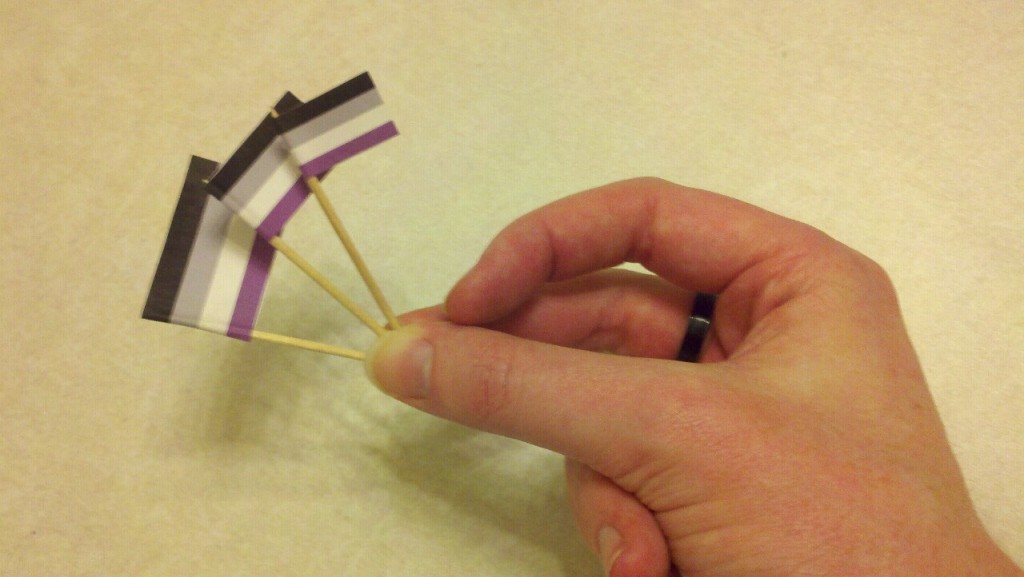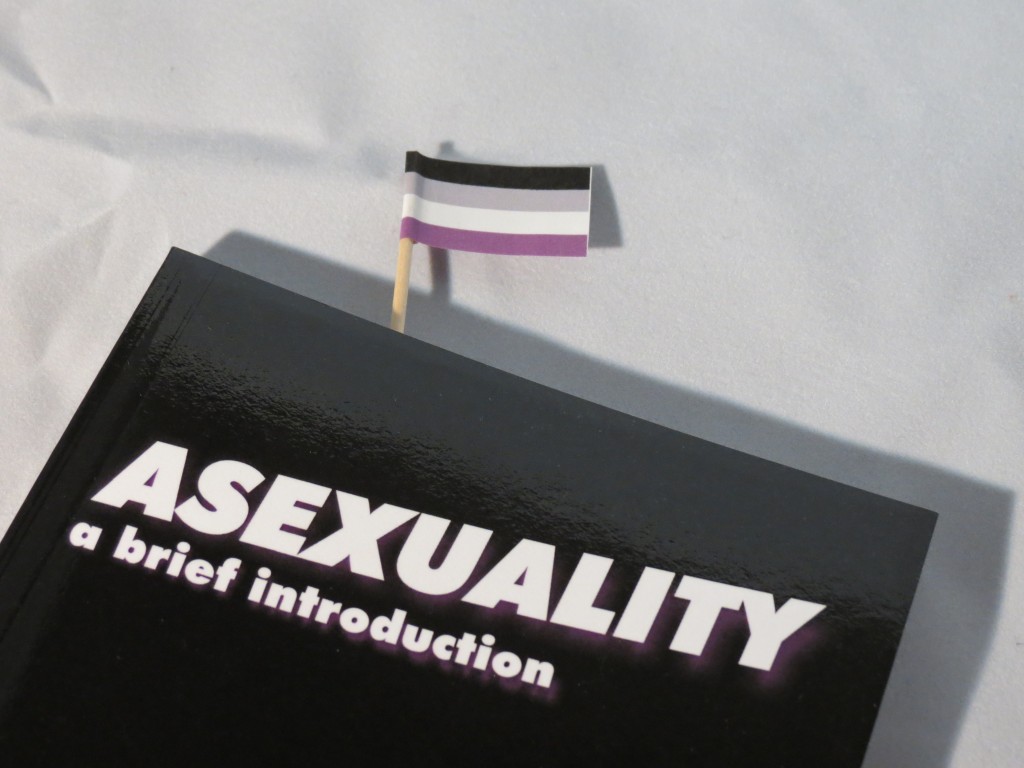I’ve heard about something called the “Ace Umbrella”. What’s that about?
There’s a gray area between asexuality and non-asexuality. Some people say that they occasionally experience sexual attraction, yet still relate to asexuality. The ace umbrella encompasses asexuals, as well as people in this gray area.
Some people, known as “gray-asexuals”, experience sexual attraction infrequently or not very strongly or possibly aren’t quite sure whether or not what they experience is sexual attraction.
One subtype of gray-asexuals, known as “demisexuals”, can experience sexual attraction only after developing a close emotional bond with someone.
So, if asexuals don’t experience sexual attraction and these people do, why the “umbrella”? What do you have in common?
Many graces and demis tend to feel alienated by or disconnected from the sex-charged culture that they see around them. Most of the time, they do not experience sexual attraction, same as asexual people. When they do, the manner or frequency with which they do does not align with how “everyone else” describes their experience with sexual attraction. In this way, their experiences are often very similar to the experiences of asexuals.
Many times, demisexuals and gray-asexuals will even identify as asexual or something like “asexual with an exception”. The frequency of sexual attraction may be so low that they go years without feeling it, so, for all intents and purposes, they are equivalent to asexual during that period.
But isn’t that just “Normal” sexuality? Most people aren’t attracted to everyone all the time.
Certainly, most people don’t feel constant sexual attraction. However, most people seem to feel it fairly frequently. Often it’s toward a romantic partner, but throughout the day, there might also be the hot co-worker or the random stranger on the sidewalk or the celebrity with the great body. Even if most people don’t act on it, the attraction is still present. Grays and demis aren’t like that. For a gray-asexual or a demisexual, there may be years between episodes of sexual attraction or there may have been only one person that’s ever caught their eye.
So… “Demisexual”? Does that mean they only sleep with demi-gods? Demi Moore?
Unlike “hetero-” or “homo-” or “a-“, etc., which describe the gender(s) that a person is or isn’t attracted to, “demi-” describes the circumstances in which a person may experience sexual attraction. Demisexuals are only capable of feeling sexual attraction after they’ve developed a close emotional bond with someone. Even then, they still might not feel anything.
It sounds like demisexuals are trying to make themselves out to be special because they only have sex with people they love.
Demisexuality is about attraction, not action. It doesn’t mean that people are picky about their sexual partners. It doesn’t mean that they’re “saving themselves for the right person”. When someone says that they’re demi, they mean that they can’t experience sexual attraction unless they’re close to someone. They’re not choosing to repress sexual feelings for others because they don’t have anything to repress.
Furthermore, demisexuality says nothing about who a demi has sex with, or if they even have sex at all. It’s possible to be demisexual and a virgin. It’s possible to be demisexual and repulsed. And it’s possible to be demisexual and sleep with anyone who is willing. Demisexuality is only about the circumstances where one can experience sexual attraction, not about sexual activity.
It’s also important to note that demisexuality is not, in any way, a value judgment against other people. Just because they only experience sexual attraction after developing an emotional bond, that does not mean that they feel there’s anything wrong with people who don’t require that bond to experience sexual attraction.
Okay, so they’re only sexually attracted to people that they love?
Not necessarily. The close emotional bond does not have to be love. It could be friendship, it could be a work relationship, or any number of other strong emotional connections. Something purely platonic might still be capable of triggering sexual attraction.
How long does it take a demisexual to develop sexual attraction after forming the emotional bond?
Every situation is different. Many demis say that it can take anywhere from months to years to come about. Maybe less time, maybe more. It’s not like there’s a chess timer that starts ticking the moment you meet someone, and if you don’t feel sexually attracted to them by the time the hands go all the way around, you’re not going to.
Are gray-a’s just asexuals who have sex?
It’s not about what someone does, it’s about what they feel. If an asexual has sex, they’re an asexual who has sex, not a gray-asexual. If an asexual masturbates, they’re an asexual who masturbates, not a gray-asexual. The difference between “asexual” and “gray-asexual” is one of attraction, not behavior.
It’s not about enjoying sex, either. If an asexual likes sex, they’re an asexual who likes sex, not a gray-asexual. It’s possible to enjoy sex and sexual activities and not experience sexual attraction.
How can someone be “Gray”? You’re either asexual or you’re not. Clear as that.
Is it clear where you fit if you’ve only felt sexual attraction once in your entire life, then never again? Is it clear where you fit if you occasionally feel something that could potentially be sexual attraction, but it’s so weak that a passing breeze is enough to make it stop? Is it clear where you fit if you’re sometimes sexually attracted to people and you like sex, but don’t feel any drive to seek it out and would be fine without it? Is it clear where you fit if you’re not sure what sexual attraction even is, let alone whether or not you’ve felt it? Gray-asexuals live in this land of confusion.
So what is gray-asexuality, then? The description you’re giving is a bit fuzzy.
The definition of “gray-asexual” is intentionally vague. It’s meant to be a catch-all for anyone who feels they fall somewhere near asexual on the spectrum between “sexual” and “asexual”. There’s no strict criteria for what makes someone “gray”, there’s no shining dividing line. If there were, it wouldn’t be a gray area.
It’s a bit like the purple spectrum between red and blue. When you’re close to red or blue, the color can be described as “reddish” or “bluish”. There’s no clear line where being “reddish” stops, but it’s clear that it stops somewhere. I mean, you can’t be one tick away from blue and still describe the color as “reddish”. Gray-asexuality is sort of like “asexual-ish”.
Do demisexuals and gray-asexuals fall in love?
Like asexuals, graces and demis come in all flavors of romantic orientation. Someone can be a heteroromantic demisexual or a panromantic gray-asexual. For a demisexual person, a romantic relationship could potentially be the catalyst for sexual attraction, however, it won’t necessarily happen just because someone’s in love.
Gray-asexuals and demisexuals can be even aromantic and not be romantically attracted to anyone. Additionally, a person can be demiromantic or gray-romantic, which are similar to being demisexual or gray-asexual, but around romantic attraction, rather than sexual.
How can you know you’re demi or gray and not asexual?
Well, if you experience sexual attraction occasionally, that’s a pretty good sign that you’re not asexual.
Aside from that, if you feel like you’re almost asexual, but not quite for some reason, then perhaps gray-asexual would be a better fit. If you’re asexual most of the time, but there’s that one person you’re close to who’s an exception, then maybe demisexual would work.
How can you know you’re asexual and not demi or gray?
If you don’t feel like you’re demi or gray, then you’re not. There’s no 100% surefire way to determine that just because you’ve never experienced sexual attraction before, that you won’t tomorrow. You can be fairly sure that it’s not going to happen if it’s never happened before, but it can’t be ruled out completely. It’s a bit like a scientific theory: It can never be proven entirely, it can only be disproven. After all, everyone who has experienced sexual attraction had a first time, and they probably weren’t expecting it to happen, either.
Look at it this way: There are plenty of straight people in the world. Most of them have never been attracted to a member of the same sex. But how can they know for sure that they won’t be? How can they be certain they don’t have dormant bisexual tendencies? The common response is “Well, I just know“, but really, it’s impossible to know for sure. It’s not something that stresses out a lot of straight people, yet I see a lot of aces worried that they might really be gray or demi.
For me, I’m asexual. I don’t expect that it’ll turn out that I’m actually gray or demi, but if it does, I’m not going to push it away. If I happen to experience sexual attraction one day, then okay, I’ve learned that I’m not asexual after all. I’m not going to let this word that describes me very well right now tell me what to do in the future. You’re not permanently locked into asexuality for the rest of your life once you’ve used the word to describe yourself, so if it no longer fits, don’t try to make it fit.






